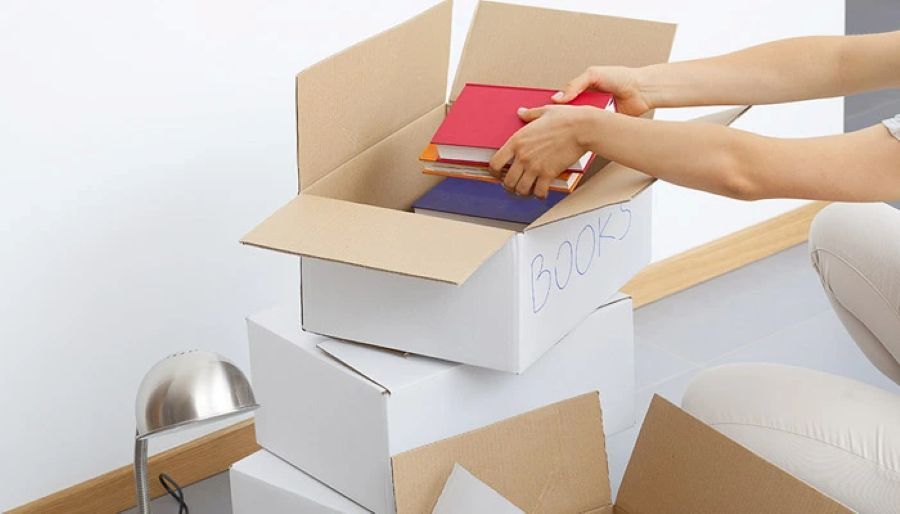Do Babies Get Stressed When Moving?
Yes, babies do get stressed when moving. Even though they can't tell you how they feel, babies are very sensitive to changes in their world. When you move homes, your baby notices that everything looks, sounds, and feels different. This big change can make them feel worried and upset.
Moving is one of the top stressful events for families. And when you have a baby, the stress can affect everyone in the house. But don't worry - there are simple ways to help your baby feel calm and safe during your move. This guide will show you how to spot stress in your baby and give you easy tips to make moving day better for your whole family.
Why Do Babies Get Stressed When Moving?
Their Brains Are Still Growing
Babies' brains are highly sensitive during the early months, which means they react strongly to changes around them. Research from the University of Edinburgh shows that stress can affect baby brain development, particularly in areas involved in emotional and social development. When everything in their world changes at once, their little brains work extra hard to make sense of it all.
They Love Routine and Familiar Things
Babies feel safe when things stay the same. They like:
- Sleeping in the same room
- Hearing the same sounds
- Seeing the same faces
- Following the same daily schedule
When you move, all these familiar things disappear. This makes babies feel unsure and scared.
They Can Feel Your Stress Too
When parents experience ongoing, significant stress, babies absorb it. Research from ZERO TO THREE shows that babies pick up on their caregivers' facial expressions and tone of voice—whether they are sad, angry, or happy—right from the start. If you're feeling stressed about the move, your baby will sense it and start feeling stressed too.
How to Tell If Your Baby Is Stressed
Changes in Sleep
Moving stress can mess up your baby's sleep. You might notice:
- Taking longer to fall asleep
- Waking up more at night
- Shorter naps during the day
- Fighting bedtime more than usual
Eating Problems
Stressed babies often eat differently:
- Not wanting to eat as much
- Being fussy during feeding time
- Spitting up more than normal
- Wanting to eat all the time for comfort
Different Crying Patterns
Babies who suddenly seek constant physical contact may feel insecure or anxious about their surroundings. You might hear:
- More crying than usual
- Crying that's harder to stop
- Fussiness for no clear reason
- Wanting to be held all the time
Body Language Signs
Physical symptoms like a tense body or clenched fists sometimes appear as well. Watch for:
- Tight, clenched fists
- Stiff or tense body
- Arching their back
- Turning away from you
The Science Behind Baby Stress
What Happens in Their Body
When a baby feels stress, the brain responds by releasing the stress hormone cortisol, which activates the body's stress response. Cleveland Clinic explains that infants three months of age who received consistent responsive care produced less cortisol. This means that how you respond to your baby during stressful times really matters.
Why Quick Action Helps
If a young child's stress response is activated in the context of supportive relationships with adults, the physiological effects of stress are buffered and return to baseline levels. The faster you help your baby feel calm, the better it is for their developing brain.
Long-Term Effects
When these responses remain activated at high levels for extended periods of time—without supportive relationships to help calm them—the responses meant to be protective can become harmful. Harvard's Center on the Developing Child explains that toxic stress can disrupt the healthy development of brain architecture and other bodily systems. This is why it's so important to help your baby through the moving stress.
Tips to Reduce Moving Stress for Babies
Keep Your Baby's Routine
Try to keep feeding, sleeping, and playtime on the same schedule. Even if everything else is different, these familiar patterns help your baby feel safe.
Pack a Special Baby Bag
Make a bag with everything your baby needs for moving day:
- Diapers and wipes
- Favorite toys and blankets
- Bottles and food
- Change of clothes
- Pacifiers
Set Up Baby's Room First
Keeping a routine helps your baby feel safe during all the changes. Try to stick to the same nap times, bedtimes, and mealtimes you had before the move. When you get to your new home, unpack your baby's room before anything else. Use the same crib sheets, toys, and decorations from the old house.
Stay Calm Yourself
Your own attitude toward the relocation can also have a tremendous impact on how your child handles the move. If you let your child see that you are stressed, sad, or angry about having to uproot the family, your child will likely feel stressed, sad, and angry too. Take breaks when you need them, and ask for help.
Best Ages to Move with Babies
Newborns (0-3 Months)
The relocation will have close to no negative effect on children under the age of 5. Very young babies adapt easier because they haven't formed strong connections to places yet. They mainly need:
- Food
- Clean diapers
- Lots of love and attention
Older Babies (3-12 Months)
Babies can begin feeling sadness and fear as early as 3-5 months of age. Research from the March of Dimes shows that at this age, babies start to notice their surroundings more. They might:
- Be more clingy
- Have trouble sleeping
- Cry more often
- Need extra comfort
Toddlers (1-2 Years)
At this time, toddlers have a short attention span, as their brain's capability of creating long-term memories has not fully developed yet. Moving with toddlers can be harder because they understand more but can't express their feelings well.
How to Help Different Age Groups
For Newborns
- Keep them close to you
- Use familiar blankets and clothes
- Stick to feeding schedules
- Make sure they get enough sleep
For Older Babies
- Bring favorite toys
- Play soft music they know
- Keep bedtime routines the same
- Give extra hugs and cuddles
For Toddlers
- Talk about the move in simple words
- Let them help pack their toys
- Read books about moving
- Visit the new house before moving day
Making Moving Day Easier
Plan Ahead
Thorough preparation can make moving day run smoothly and keep your whole family's stress levels low. Start getting ready weeks before you move:
- Pack non-essential items early
- Arrange for help from family or friends
- Book professional movers who understand families with babies
Create a Calm Space
Set up a quiet area in both your old and new home where your baby can rest away from all the moving activity. Include:
- Soft blankets
- Favorite toys
- Comfortable chair for feeding
- White noise machine
Keep Your Baby Away from Chaos
If you need to look after your baby during the move itself, think about setting up safe and comfortable baby-friendly environments in your old and your new home. Consider having a family member or friend watch your baby during the busiest parts of moving day.
After the Move: Helping Your Baby Adjust
Be Patient
Most families will move homes at some point in their lives... it can take a year or more for your child to fully adjust to a new home. Give your baby time to get used to their new surroundings. Some babies adjust in a few days, others might take weeks.
Maintain Familiar Routines
Simple habits like a bedtime story or the same morning song can go a long way in helping your child adjust. Keep doing the same things you did before the move:
- Same bedtime routine
- Same songs and books
- Same feeding schedule
- Same playtime activities
Watch for Warning Signs
Your child may need extra support during the transition if they show some or all of the following signs: Regressing – for example, they're wetting the bed or waking up at night after passing these child development milestones. Call your pediatrician if you notice:
- Sleep problems lasting more than two weeks
- Eating problems that don't improve
- Excessive crying or fussiness
- Regression in development
When to Get Professional Help
Medical Support
Contact your pediatrician if your baby:
- Won't eat for several days
- Seems sick or has a fever
- Cries for hours without stopping
- Shows signs of severe stress
Moving Support
Consider hiring professional movers who:
- Understand family moves
- Can work quickly and quietly
- Offer packing services to reduce your stress
- Have experience with local moves in your area
Creating a Stress-Free Moving Plan
Start Early
Begin planning your move at least 6-8 weeks ahead. This gives you time to:
- Find the right moving company
- Pack gradually
- Prepare your baby slowly
- Arrange childcare for moving day
Use a Moving Checklist
A good moving checklist helps you stay organized. Include special items for your baby:
- Transfer pediatrician records
- Pack baby supplies last
- Set up nursery first
- Find new pediatrician
Consider Storage
If you need time between homes, storage solutions can help. This way, you can move your baby's most important things first and get settled before dealing with everything else.
Common Moving Mistakes to Avoid
Don't Rush the Process
Moving too quickly can stress everyone out. Take time to:
- Pack properly
- Say goodbye to the old house
- Let your baby adjust gradually
- Set up the new home thoughtfully
Don't Ignore Your Baby's Needs
Even with all the moving chaos, your baby still needs:
- Regular feeding times
- Enough sleep
- Comfort and attention
- Familiar routines
Don't Try to Do Everything Yourself
Moving is hardly ever entirely stress-free, but there are plenty of tips and tricks to help reduce the stress of moving day. Don't be afraid to ask friends and family members for help, or consider hiring professional movers. Ask for help with:
- Packing
- Cleaning
- Watching your baby
- Setting up the new home
Final Thoughts
Moving with a baby doesn't have to be a nightmare. Yes, babies do get stressed when moving, but with the right preparation and care, you can make it much easier for everyone. Remember that your baby's stress is normal and temporary. By keeping routines, staying calm, and giving lots of love and attention, you can help your little one adjust to their new home.
The key is to plan ahead, be patient, and don't be afraid to ask for help. Professional movers who understand families can make a huge difference in reducing stress for both you and your baby. With time and care, your baby will feel safe and happy in their new home.
If you're planning a move in the Edmonton area, Last Stop Moving specializes in helping families relocate with care and understanding. Our team knows how to make moves easier for families with babies and young children.



